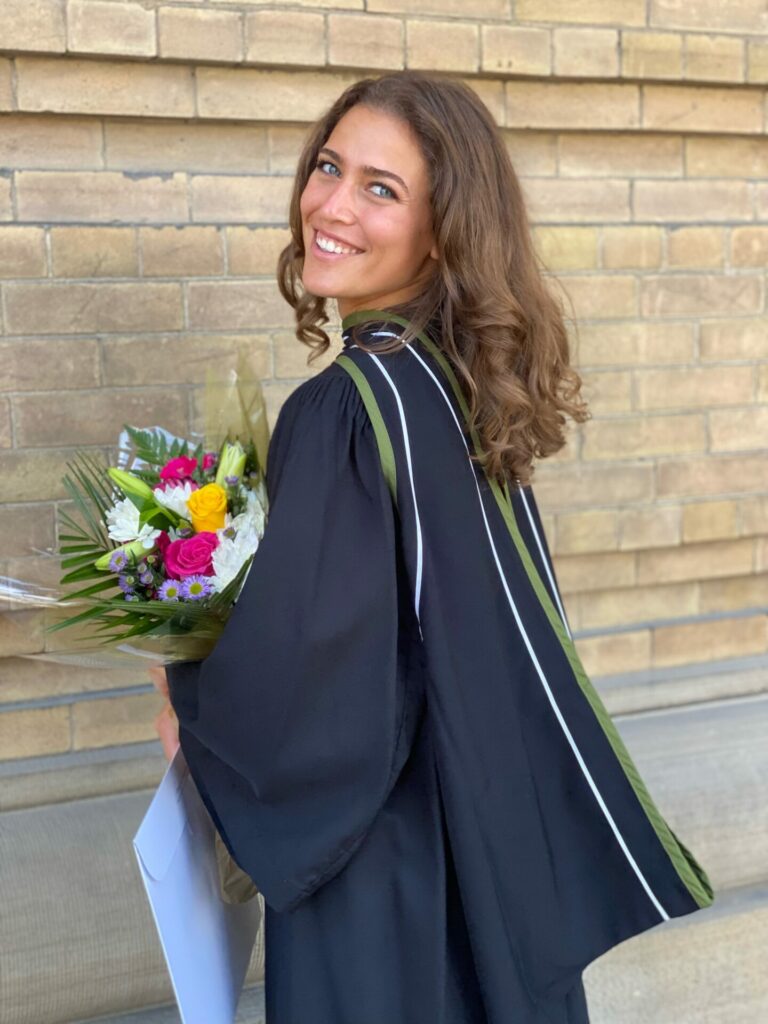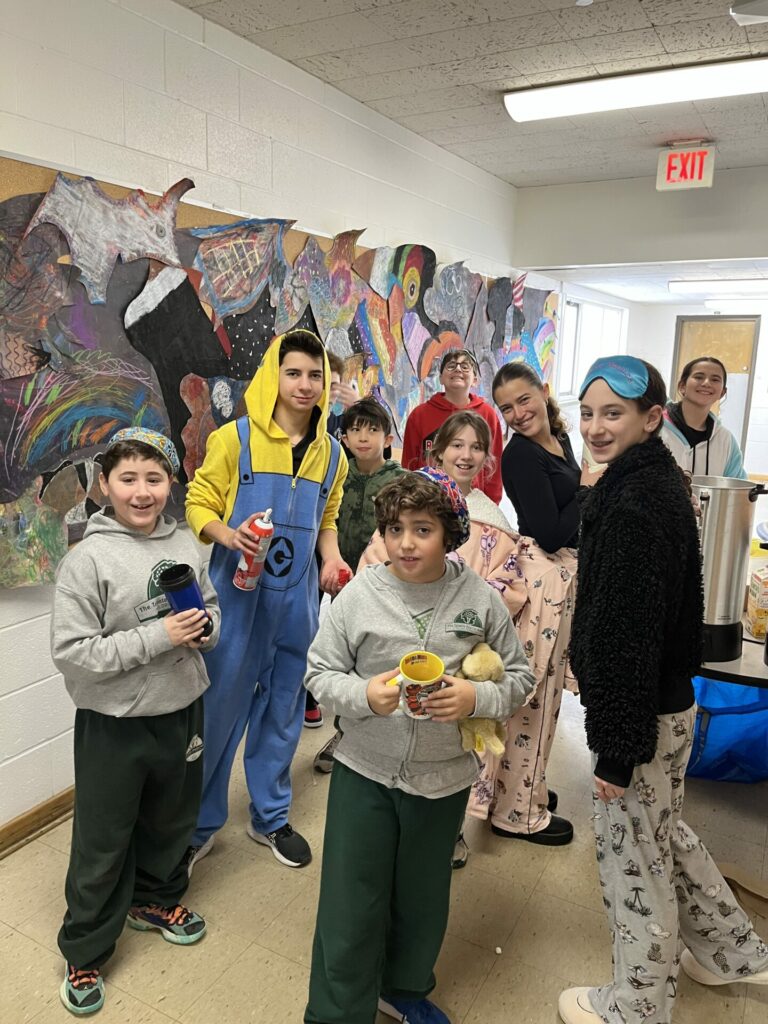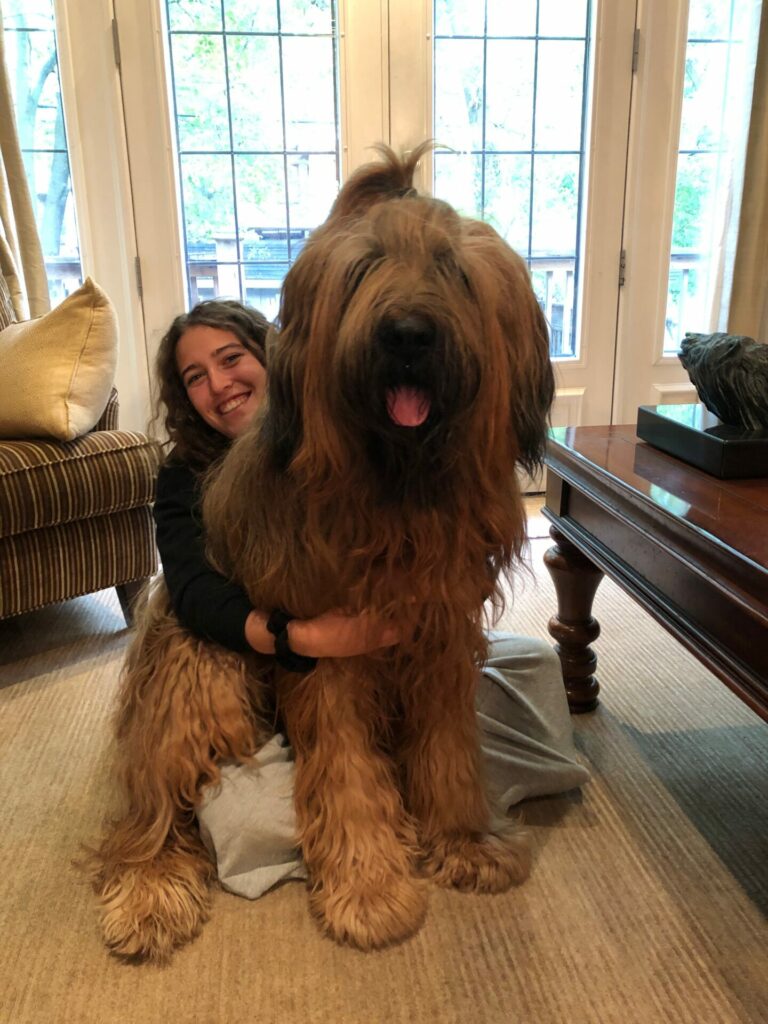Emily Young started her time at Heschel as a Social Work student and is now our Derekh Eretz & Tikkun Coordinator. Keep reading to find out what that means!
Heschel Hive (HH): Thanks for joining us today, Emily. You started at Heschel as a Social Work student last year. Where did you go to school and why did you decide to study Social Work?
Emily Young (EY): I always knew I wanted to study social work. My mom is a therapist. I have a lot of people in the helping profession in my life, so that was kind of always my journey. And I really do love working and interacting with people and getting to listen to their stories. It’s just such a unique and interesting type of job where you really don’t see or face the same thing every day, and that was very intriguing to me.

In terms of my education, I started my social work journey at Western, where I did my Bachelor of Social Work. From there I took some time and worked a little bit. I wanted to gain some experience to make sure that this was really for me, and I decided it was. I went back to school last year to do my Master’s at U of T, and I was very lucky to match here at Heschel for my placement. I’ve been here ever since.
HH: What did you do after your Bachelor’s that helped you to solidify that interest?
EY: From there, I went and worked at an all-girls’ boarding school, which was a very interesting role that peaked my interest in working at a school. When I went back to do my Masters, I very specifically tried to match into a school to get more experience in that environment, and I love it. I think it’s such a such a fun and interesting environment for a social worker to be in. There are so many different routes in social work, but this is the one for me.
HH: Many readers may be wondering: what are your responsibilities as the Derekh Eretz & Tikkun Coordinator?
It’s definitely very unique role, so I understand! The majority of what I do is to work with the students and the teachers to make sure that students feel calm, confident and comfortable in the classroom. That’s the basic outline of what it is. I think of myself as a helping hand to teachers and a listening ear to students. A big part of my role is supporting students through whatever challenges or dysregulation they might be experiencing and working to like really collaboratively problem solve, and reflect, to find out what is working best for them and what we could maybe do differently. So I help students identify their responsibility as a Heschel student and adhere to our Derekh Eretz principles, but also acknowledging that sometimes that’s very difficult to do; it’s hard to be at school for 8 hours of the day, and we understand that and validate that, but how can we make that easier for you and how can we ensure that we’re our best selves here at school? And so that’s why I when issues arise, I’m here to walk students through the Tikkun process and help them reintegrate back into the classroom, because it could be hard to come back after you have had a challenging day, so it’s good to have someone be able to help walk you back through that process.
I try to be a calming presence for our students and offer them a safe space to decompress and debrief throughout the day. I also collaborate a lot with teachers and families to ensure students are set up for success and everyone’s needs are being met and understood. Beyond this, I try to help the students learn and develop helpful skills and strategies to combat everyday challenges and stressors. For example, I will help run an SEL (social-emotional learning) workshop about building resilience, or work with a student to create a classroom routine checklist, or mediate a challenge between friends, etc.
I also try to join in on classes, activities, or outdoor time with the students to build stronger connections. I try to check-in with students in the hallways in the morning, join in for Kabbalat Shabbat, host a calming art activity at lunch, and facilitate fun and engaging activities with the students whenever possible!

HH: How do you see Derekh Eretz Code being lived at the school by the students?
EY: I see it every day. I always tell people that the students here are some of the most kind and welcoming students. I think because of this code that they’ve grown up with, they really learn to understand and integrate it into their everyday lives. They’re so welcoming, so emotionally intelligent, so intuitive, so kind to each other, and I think that it’s just built into the walls of the school. It’s really part of the school and part of their everyday lives, so much so that they do such kind and amazing things without even thinking about it. I definitely think that’s in part due to Derekh Eretz and our agreement to act towards each other with respect and kindness.
HH: Parents in the school community know what Derekh Eretz is – they need to read and sign the Derekh Eretz Code of Conduct – but other than through the weekly middah program, is there some other way the students learn what the Derekh Eretz Code of Conduct is about?
EY: Just by modeling. By our staff modeling it to our students, our staff interacting with each other, our students interacting with each other, our families interacting with each other, just all of these beautiful interactions that are filled with so much welcoming energy. I think they just see it, respond to it, reciprocate it, and replicate it.
HH: Can you speak a little bit more on what the Tikkun process looks like?
EY: It’s a really interesting process that I haven’t seen at another school. But it makes a lot of sense because it really asks the students to look at where they missed the mark, or what the challenge was. Who did it impact? What was the impact on yourself and other students, your peers, your teachers, whoever it might be, and how can we reflect and move forward? That process includes looking at our middah and our texts, building connections between those things and ourselves, applying them to the situation, and then taking that as a meaningful experience to learn and grow. And then what can we do differently? How can we come out the other side? How can we give back to our community? How can we give back to ourselves? It’s all a very kind of nicely moving, flowing process.
It’s really nice for me to be able to work with the kids from the start to the finish, and then again, at the very end, help them reintegrate back into the community and back into their classroom, feeling confident, calm, and like they can face that same challenge or a similar one, maybe taking a different route or path.
HH: Once students have gone through the Tikkun process, do you often see the problematic behaviour re-emerge?
EY: It depends. Students will often learn a lot from the process, but that doesn’t mean there’s not more experimenting to be done, more learning to be learned. We do often learn and grow from our experiences, but sometimes there are different routes and paths to take, and sometimes we don’t always find them on the first try and that’s fine. That’s part of the process, and that’s why we’re here to help them find that perfect path. Students can then remember in the future, years from now, when this situation happened to me, I tried this, I tried that, and then what really worked for me was this specific thing.
HH: At what point would you be asked to come in to help guide the process?
EY: I try to be as proactive as I can, so when we’ve identified that a student is struggling, or there’s something going on that they might need some assistance or support with, I’ll check in with them and we’ll try to build some strategies and navigate those issues before they blow up. Sometimes the blow-up happens, and that’s okay. It’s really lucky in this role that I can be flexible and move around to different classrooms, the schoolyard, ot at Kabbalat Shabbat, or wherever I might be needed, and help the child navigate in that in the moment. It’s really impactful being able to model what calm behavior looks like, what regulated behavior looks like, and to work with the student in the moment when they’re feeling really heightened and stressed and bring them back down to a place where they can problem solve collaboratively and work through that. Students have done a really good job learning that when they are experiencing something that is challenging for them, they can seek out my support, and I will help walk them through it before they really get to the point where they feel like everything’s boiling over.
HH: You mentioned being able to float between different situations on an as-needed basis but there’s only one of you. What happens if there are multiple situations that need your help at the same time?
EY: I wish that I could clone myself! That would be amazing. But I try to let the students know that I’m here all day or all week, and if there’s a problem and I can’t be there to help them face it in the moment, they have the skills and strategies in their toolbox to deal with these things as they come up, and I will be there to help them through it as soon as I can. Lately I have been putting up a nice laminated sheet on my door that says where I am and what time I’ll be back, but most of the time a lot of problems the students face they find ways to regulate, and they find ways to work it out, and that helps them build their skill set even deeper. And then, if it’s a continuing persistent thing, and they really are looking for more support, I will always find time, and I will schedule a time later for us to talk through that, and it’s kind of an opportunity to reflect on what worked and what didn’t in that moment. When we look back at it later once the problem has been dealt with, or once we’ve calmed down, we can look back and see, “Oh, actually that wasn’t such a big deal that I was that I felt like it was in the moment,” or “actually, yes, it was a big deal. I need some more help to work through it,” and then I’m there to help them work through that as well.
HH: Well, we’re lucky to have you here to help the students to navigate.
HH: Most schools don’t have a Derekh Eretz & Tikkun Coordinator. How did this role come about and why is it important?
EY: The role was really developed when we were trying to create the best support system for our students as possible. A full day of school can be very challenging for many students, especially after COVID and online learning. It was very challenging for a lot of our students to come back and face a day of school, and that makes a lot of sense. It was very challenging for adults; we can only imagine how hard it would be for our students. It’s completely understandable that students would struggle with various things throughout the day, and it’s helpful to have someone there for students and teachers who can support and work with them through challenges in the moment. Students can then look back and say, “oh, I remember when Morah Emily came here to my classroom and helped me work through this problem, and I’m going to use what I’ve learned to help me make it through and push through to the end of whatever I’m experiencing.” We realized that it’s helpful to have one person who can not only guide the students through the Tikkun process when they miss the mark, but also help them discover what can help them feel regulated in the classroom. It’s important to recognize where those challenges lie, whether it be social navigation, stress, self-advocacy, motivation, or whatever it might be, and be proactive about developing concrete strategies to overcome those challenges. The great thing about my role is that I, again, have the flexibility to go figure out what’s causing stress to the student in that moment, and then help them problem solve, or provide support, and then reflect and reintegrate together at a later time.
HH: Now that you’ve been at Heschel for a while, what do you like best about working here?
EY: I think one of my favorite things about working at Heschel is that sense of connection and community here. I feel like a lot of people would say that as their answer to this question, because it’s so true and we really feel it. I have worked at a couple of different schools, but never one where every single teacher knows each student’s name and vice versa. I think that’s beautiful, and it’s amazing how the students grow up and learn together as a very cohesive group. Also, the staff here are so kind and so welcoming, and they really made my transition from being a student to being a full-time staff member very easy and smooth and lovely.
HH: Just for fun, Emily…
What is your favourite karaoke anthem?
EY: I actually just went to karaoke with my friends for a friend’s birthday. We all sang Piano Man, it was so much fun because it got everyone singing and belting out the song so I think that’s a good one.
HH: What simple food will you never eat that most people eat?
EY: I literally can’t eat celery. I don’t know how people are always saying it doesn’t taste like anything. I think it has the strongest taste ever, and I don’t like it!

HH: Do you have any pets?
EY: I have a very big dog. He’s 100 pounds and his name is Fred. He’s a Briard. It’s like a big French sheepdog, very cute. I love dogs, and all animals, but mostly dogs. My backpack is covered with dogs.
HH: What do you do if Fred doesn’t want to do what you want him to do, like go for walk, or take a bath? How do you manage with a 100-pound dog?
EY: You don’t. He just calls the shots. Whatever he wants is kind of what he gets!
About This Column
Our Meet the Community blog column gives Heschel families the opportunity to get to know some of the people who make a difference at The Toronto Heschel School.
Browse Column Archive









